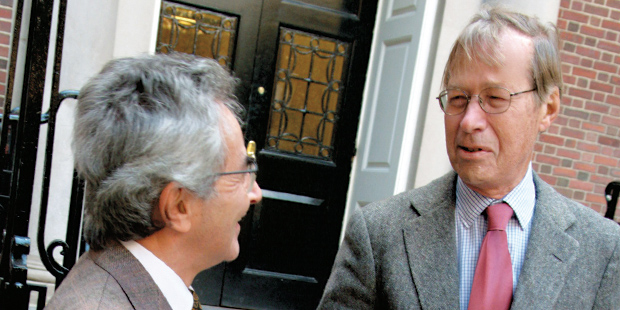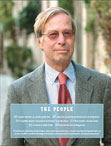Ronald Dworkin, 1931-2013
Printer Friendly VersionI first met Ronald Dworkin 45 years ago in the bar of one of those faceless, interchangeable hotels where conventions of the American Philosophical Association always take place. Amid the general grunge that typically characterizes any gathering of philosophers, Dworkin, with his beautifully tailored suit, gleaming cuff links, and silk breast-pocket handkerchief, stood out as a visitor from another planet. He was in the company of my former teacher John Rawls, whose frayed cuffs, scuffed shoes, and abstracted air made the contrast even more vivid.
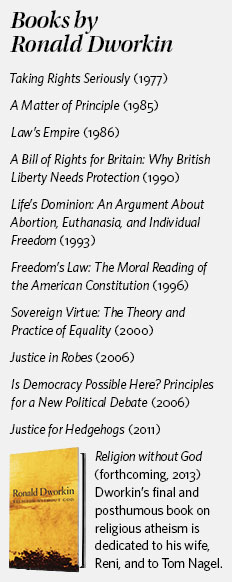 The juxtaposition of Dworkin’s worldly, elegant hedonism and Rawls’s unworldly, tattered asceticism is an indelible dash of color in my image of the philosophical domain. These two very different Americans were jointly responsible for an enormous change in our moral and intellectual environment during the latter part of the 20th century—Rawls in political philosophy and Dworkin in legal philosophy. They brought the clarity and logic of analytic philosophy into normative fields from which they had been excluded by the earlier prejudices of logical positivism. Both of them deepened and gave articulate form to questions and arguments that arose from the most urgent political and legal issues of our time.
The juxtaposition of Dworkin’s worldly, elegant hedonism and Rawls’s unworldly, tattered asceticism is an indelible dash of color in my image of the philosophical domain. These two very different Americans were jointly responsible for an enormous change in our moral and intellectual environment during the latter part of the 20th century—Rawls in political philosophy and Dworkin in legal philosophy. They brought the clarity and logic of analytic philosophy into normative fields from which they had been excluded by the earlier prejudices of logical positivism. Both of them deepened and gave articulate form to questions and arguments that arose from the most urgent political and legal issues of our time.
But Dworkin also did something else: he wrote for the public. Rawls, who did not have this gift, greatly admired Dworkin’s capacity to explain difficult moral issues about law, politics, and society in lucid terms to a general, nonacademic audience—without in any way watering down or simplifying his subjects. Rawls said that in this respect Dworkin had made a contribution in our own day comparable to that of John Stuart Mill in the 19th century—a just and memorable tribute.
Dworkin’s legal theories developed in critical response to H.L.A. Hart’s legal positivism—the view that facts about what the law is are essentially social facts. In the alternative view that Dworkin developed, facts about what the law is are essentially moral facts about the rights of individuals and the justification of the use of state power over those individuals—though these moral facts depend in large part on social facts, together with general moral principles. The theory is set out most fully in an early major work, Law’s Empire, published in 1986. It has the consequence that when judges are faced with a difficult question of law, whether in statutory, common law, or constitutional adjudication, they cannot avoid engaging in moral reasoning in order to settle it. It is not surprising, therefore, that judges with different moral convictions will come to different conclusions about the constitutionality of affirmative action, for example, or restrictions on campaign finance, or prohibition of same-sex marriage. This does not cast doubt on the legitimacy of such adjudication, nor does it mean that there is no right answer. Dworkin believed that there was no alternative but to include moral argument and the pursuit of moral disagreement in the process of determining what the law is.
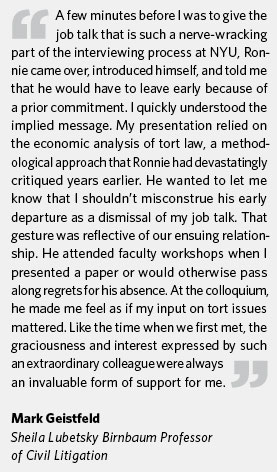 Though he began his career as a lawyer, clerking for Judge Learned Hand and then practicing at Sullivan & Cromwell for four years before he started to teach at Yale, his intellectual motivation was always philosophical. He sought understanding in the largest sense, and tried to reach the foundations of whatever claim he was investigating in general principles that could survive rational criticism. This philosophical disposition of mind led him over the course of his career to gradually expand and deepen his concerns to cover political theory, general moral philosophy, and finally the theory of knowledge—specifically the question of whether there is such a thing as objective truth, and if so, what that means, in science, in morality, and in law. All these interests are brought together in his magnum opus, Justice for Hedgehogs, published in 2011. He had become a philosopher of great range and power, offering a comprehensive vision of human life and the social good. The title is a play on Isaiah Berlin’s distinction between intellectual hedgehogs (who know one big thing) and intellectual foxes (who know many things). Dworkin believed in the essential unity of value, which permitted us to reconcile liberty and equality, individuality, community, and justice in a single comprehensive conception.
Though he began his career as a lawyer, clerking for Judge Learned Hand and then practicing at Sullivan & Cromwell for four years before he started to teach at Yale, his intellectual motivation was always philosophical. He sought understanding in the largest sense, and tried to reach the foundations of whatever claim he was investigating in general principles that could survive rational criticism. This philosophical disposition of mind led him over the course of his career to gradually expand and deepen his concerns to cover political theory, general moral philosophy, and finally the theory of knowledge—specifically the question of whether there is such a thing as objective truth, and if so, what that means, in science, in morality, and in law. All these interests are brought together in his magnum opus, Justice for Hedgehogs, published in 2011. He had become a philosopher of great range and power, offering a comprehensive vision of human life and the social good. The title is a play on Isaiah Berlin’s distinction between intellectual hedgehogs (who know one big thing) and intellectual foxes (who know many things). Dworkin believed in the essential unity of value, which permitted us to reconcile liberty and equality, individuality, community, and justice in a single comprehensive conception.
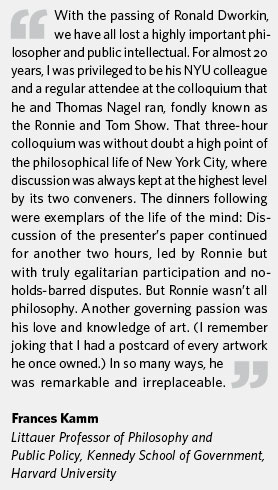 Dworkin’s greatest impact on the Law School came through the Colloquium in Law and Philosophy that he initiated in 1987 with the help of David Richards, Larry Sager, and me, and that he and I ended up conducting for the next 25 years. The mountains of theoretical material that we subjected to critical analysis in that time include some of the most interesting work on these topics, as well as some that is less interesting, but the constant element that always impressed me was Dworkin’s tirelessness and his unforced enthusiasm. He was a superb intellectual host, always communicating the sense that there was nothing he would rather be doing than talking with our guest of the week about his or her ideas. I have to admit that sometimes, when he and I met for a preliminary discussion of a thinner than-average paper for that week’s colloquium, he would look at me ruefully and say, “We’re going to have to do a lot of work.” But as soon as the author walked through the door, Dworkin was the picture of eager engagement and interest, and a spirited discussion was launched.
Dworkin’s greatest impact on the Law School came through the Colloquium in Law and Philosophy that he initiated in 1987 with the help of David Richards, Larry Sager, and me, and that he and I ended up conducting for the next 25 years. The mountains of theoretical material that we subjected to critical analysis in that time include some of the most interesting work on these topics, as well as some that is less interesting, but the constant element that always impressed me was Dworkin’s tirelessness and his unforced enthusiasm. He was a superb intellectual host, always communicating the sense that there was nothing he would rather be doing than talking with our guest of the week about his or her ideas. I have to admit that sometimes, when he and I met for a preliminary discussion of a thinner than-average paper for that week’s colloquium, he would look at me ruefully and say, “We’re going to have to do a lot of work.” But as soon as the author walked through the door, Dworkin was the picture of eager engagement and interest, and a spirited discussion was launched.
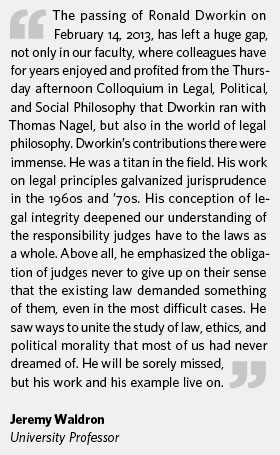 One thing that made this possible was that Dworkin cared more keenly about the answers to questions of moral, political, and legal theory, and about converting others to the right view, than almost anyone I have known. This quality of temperament is more unusual among philosophers than you might think. I’m going to steal one of Dworkin’s stories here. He once overheard a woman comforting a friend who was evidently in great distress by saying, “Be philosophical; don’t think about it.” Most of us don’t go quite that far, but I believe the norm, after a certain number of rounds in the dialectical ring, is to feel that we can let fundamental disagreements continue unresolved, and that we aren’t obliged to keep trying to convince our opponents. Dworkin, by contrast, was always good for another round. So long as anyone on the other side was left standing and unconverted, he would keep the battle going, and would leave no objection or reply unanswered. This could create problems of graceful termination, particularly when Dworkin encountered an equally tireless adversary.
One thing that made this possible was that Dworkin cared more keenly about the answers to questions of moral, political, and legal theory, and about converting others to the right view, than almost anyone I have known. This quality of temperament is more unusual among philosophers than you might think. I’m going to steal one of Dworkin’s stories here. He once overheard a woman comforting a friend who was evidently in great distress by saying, “Be philosophical; don’t think about it.” Most of us don’t go quite that far, but I believe the norm, after a certain number of rounds in the dialectical ring, is to feel that we can let fundamental disagreements continue unresolved, and that we aren’t obliged to keep trying to convince our opponents. Dworkin, by contrast, was always good for another round. So long as anyone on the other side was left standing and unconverted, he would keep the battle going, and would leave no objection or reply unanswered. This could create problems of graceful termination, particularly when Dworkin encountered an equally tireless adversary.
Among our guests over the years have been most of the people doing important work in these areas, including John Rawls, Jürgen Habermas, T.M. Scanlon, Michael Walzer, Frank Michelman, Robert Post, Kathleen Sullivan, Cass Sunstein, Owen Fiss, Seana Shiffrin, Amartya Sen, Bernard Williams, Derek Parfit, and Richard Posner. Dworkin himself presented most of his own work in progress to the colloquium, responding with his usual fluency and style to criticism from all comers. In person he displayed an astounding level of eloquence and logical speed, together with personal charm and a wonderful sense of humor. It was invariably a pleasure to be in his company, to see him engage with others, and to feel the force of his irrepressible joie de vivre. Dworkin leaves a legacy of writings that shaped our intellectual landscape, but he is also responsible for creating a continuing celebration of the life of the mind at this institution, which those who shared it with him will never forget.
This piece is adapted from a tribute Nagel wrote on the occasion of the Annual Survey of American Law dedication to Dworkin in 2006.
—
